
The International Mission Board released the following stories one year after a devastating earthquake struck Nepal, reportedly killing nearly 9,000 people and injuring more than 20,000. Read how local believers and Southern Baptists have helped impact lives.
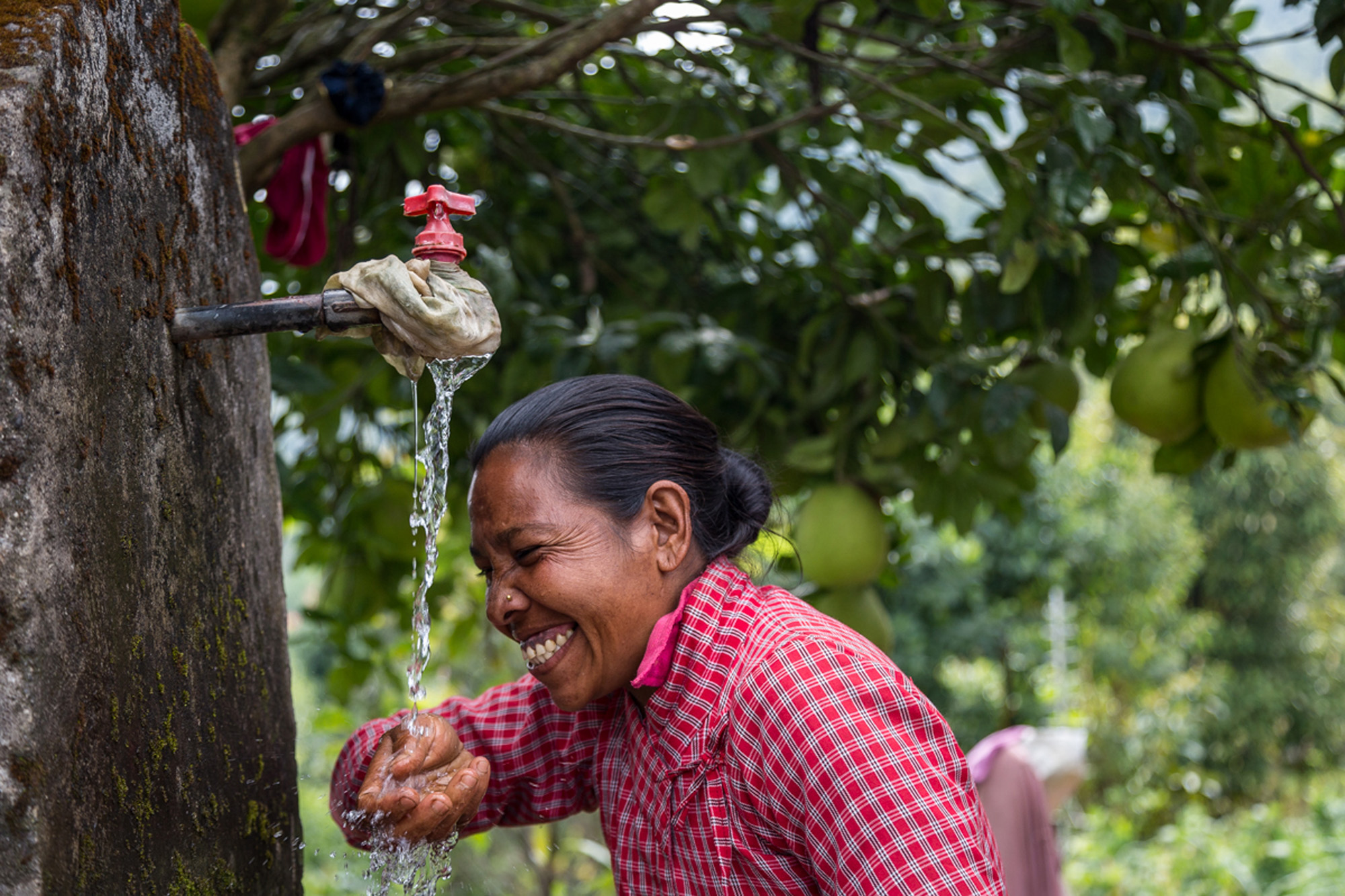 KATHMANDU, Nepal (BP) — The April 2015 earthquake in Nepal was a galvanizing moment for Rajaan Chhetri,* a church planter, pastor and mentor. Prior to the earthquake, the Lord gave Chhetri and Christian worker Reece Dehn* the vision to open a water bottling plant in Nepal to create jobs for Christians as well as meet a need for clean drinking water.
KATHMANDU, Nepal (BP) — The April 2015 earthquake in Nepal was a galvanizing moment for Rajaan Chhetri,* a church planter, pastor and mentor. Prior to the earthquake, the Lord gave Chhetri and Christian worker Reece Dehn* the vision to open a water bottling plant in Nepal to create jobs for Christians as well as meet a need for clean drinking water.
Though Nepal is the second water-richest country in the world, sources say 3 million Nepalese drink contaminated water and 85 percent drink water below international safety standards. The need for clean water and jobs grew post-earthquake.
At that time, however, God revealed to Chhetri an even greater need.
“Three days after the earthquake, I prayed to God, ‘Lord, why did you spare us? It would have been better if we died because we were a whole family together, with the church, on that morning. Living and surviving after that is difficult,'” Chhetri said.
Chhetri’s prayer echoed the Apostle Paul’s quandary in the first chapter of Philippians when he desired to depart from this life and be with Christ. Just as God answered Paul, Chhetri felt the Lord telling him he is needed here on earth to advance the Gospel.
“God clearly showed me the reason. ‘[There] are many millions whose heart is shaken by this earthquake. My hand is upon them and I want you to take the Gospel to them,'” Chhetri said, recalling the word the Lord gave him. “I said, ‘Lord, no more question[s].”
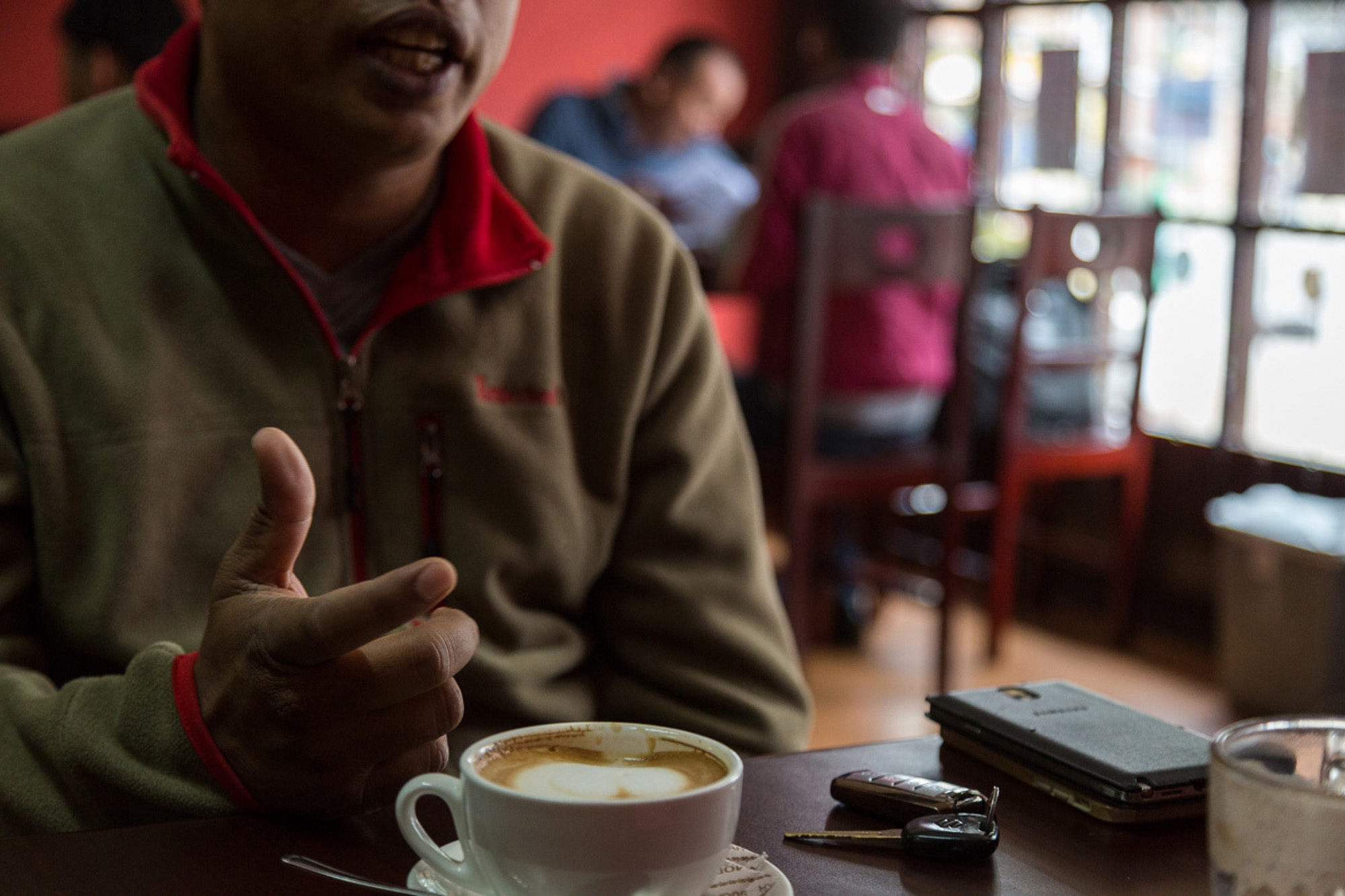 Chhetri said the Lord promised him that as a family, church and nation they would be in a better place because of the disaster.
Chhetri said the Lord promised him that as a family, church and nation they would be in a better place because of the disaster.
The 19 church planters Chhetri mentors are ministering primarily in eastern Nepal, many in rural areas. These men, as well as many pastors and believers in Nepal, struggle to provide for their families.
Many of these men want to be involved in full-time ministry but financially can’t afford it, said Dehn, a ministry partner with Chhetri.
“There is a great need for jobs in Nepal, and steady part-time jobs are almost non-existent,” Dehn explained. “In order to survive, many men leave the country to earn money in other countries. Many who are called to be leaders in the ministry in this country struggle to fulfill their call and put food on the table for their families.”
Chhetri said when he visits the men he mentors, “my heart gets burdened and I cry. When I come back home, I find myself in the same situation.”
Many of the believers live on daily wages. Some are pig farmers and others are farmers. When medical emergencies arise, the financial strain is crippling. One of the church planters recently had a kidney stone removed. He had to sell two of his pigs to pay for the procedure.
“Many times I find that there are no opportunities to work, no job creation. That’s a big problem, and so we want to do something about it,” Chhetri said.
“For many, it’s a question of survival,” Chhetri added.
The Lord clearly spoke to Chhetri about a remedy for this issue as well as a solution for a nationwide problem: water.
He said the Lord revealed the great need for water as he read in the Gospel of John about how Jesus is the Living Water.
“I felt the Holy Spirit saying, ‘what does it say?'” Chhetri said. “I said, ‘Yes Lord, you are the Living Water, there’s no doubt about that.’ And I felt the Spirit just [say], ‘What about the water that people drink for living?”
Chhetri said this, along with the staggering statistics, is how the vision for a water bottling plant started. Dehn said the water bottling distribution business will provide church leaders and church planters with jobs either in the main factory or distributing bottled water.
Some church planters will work in Kathmandu, but Dehn said most will stay in their areas and distribute the bottled water to stores.
“By the church planters staying in their areas of ministry, they will be able to continue to plant churches and be close to their families and have a part-time job that allows them to provide for their family,” Dehn said.
“This bottled water company can be a conduit for believers in America to be used by God to meet the needs of leaders here in Nepal so that they will not have to worry about how to earn money and do ministry,” Dehn continued.
Chhetri said the water bottling company will also give believers an open door to the homes and communities where they will deliver bottles. He said on average, pastors and church planters will need to work only two days a week, giving them plenty of time for ministry.
Chhetri is looking forward to the company contributing to Nepal’s economy. He said other water bottling companies exist in Kathmandu, but many do not treat the water, and it is contaminated.
“As a Christian company, it will come with the quality,” Chhetri said. He said their marketing and delivery will be different. Instead of joining the crowd of voices saying, “We are better than them,” Chhetri plans for his water cleanliness to speak for itself.
“When we come in the market, people can taste and feel it. In that way, with the distributors, local vendors, they will ask questions, ‘Why, why are you different?'” Chhetri said. “That opens a wide gate for us to witness.”
Chhetri said not all of the workers in the bottling plant will be believers.
“That will give us opportunity to meet [unbelievers] six days a week and share the Gospel and witness,” he said.
Prayer requests from Chhetri and Nepalese believers:
— Pray for funds to build the water bottling plant.
— Pray the water bottling plant will open doors to sharing the Gospel in communities.
— Pray for opportunities for believers to share about Jesus Christ, the Living Water.
— Pray for Nepalese church planters who are struggling to provide for their families and minister in communities. Pray that through this project, the believers will be able to further their witness.
Giving Opportunities:
To learn more about contributing to the operational costs of the water bottling ministry, click here.
For more information about how you can support church planters in Nepal, visit IMB’s strategic projects page and search for “South Asian people groups and Water.”
Please see additional stories below.
*Name changed.
**********
Texans & Southern Baptist women
invest in earthquake survivors
By Caroline Anderson
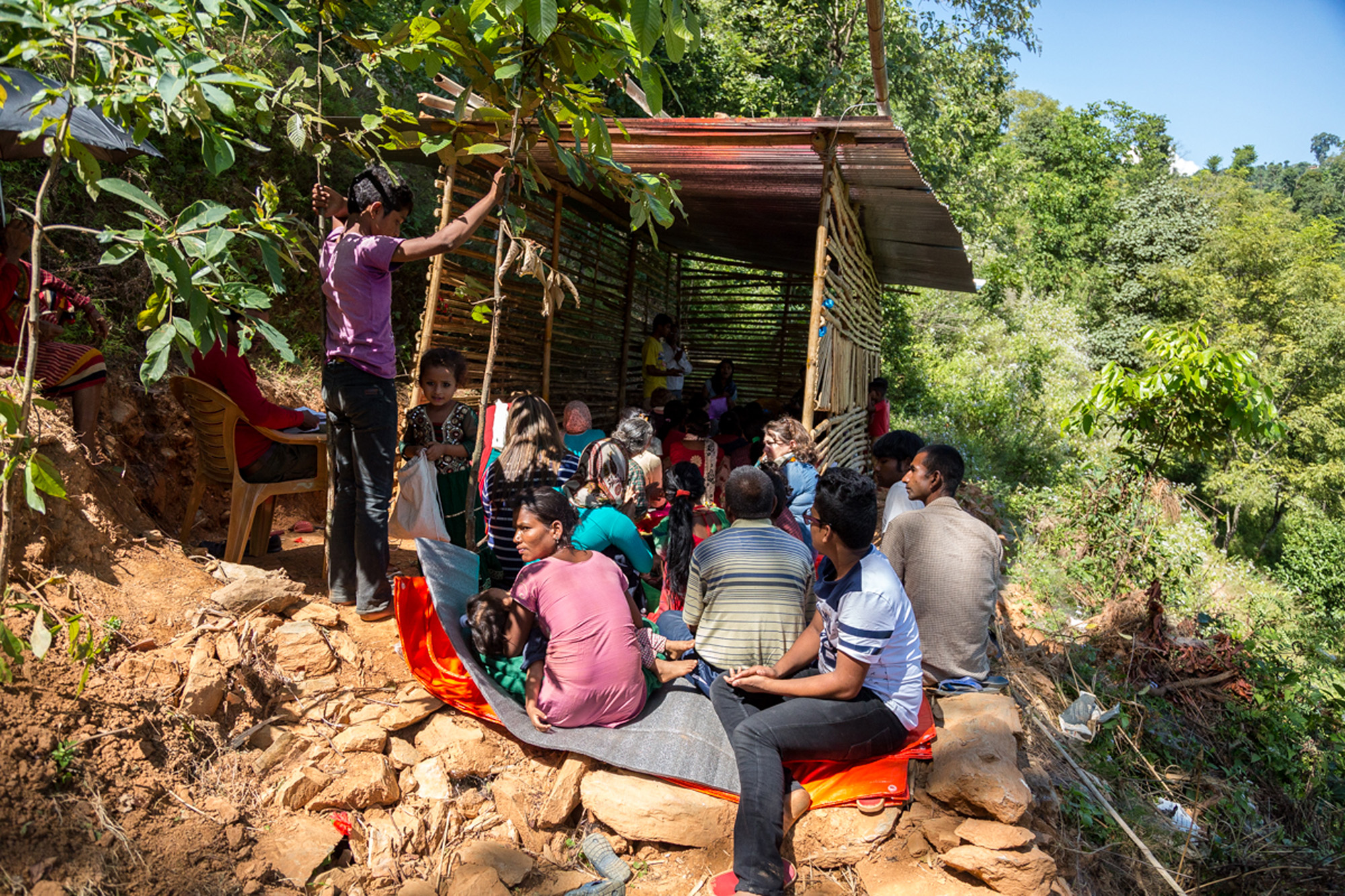 NEPAL (BP) — With a warm day ahead, believers walked on a dirt trail down the side of a mountain to reach the church. The villagers in this service reside on terraced rice slopes in the Himalayas. Seven American women joined the congregation that meets in a newly constructed bamboo church nestled in a narrow space on a ledge.
NEPAL (BP) — With a warm day ahead, believers walked on a dirt trail down the side of a mountain to reach the church. The villagers in this service reside on terraced rice slopes in the Himalayas. Seven American women joined the congregation that meets in a newly constructed bamboo church nestled in a narrow space on a ledge.
The American women came to minister to Nepali women and to see Southern Baptist relief efforts that had taken place since the April 2015 earthquake.
The Southern Baptists of Texas Convention adopted the area shortly after the quake. When their assessment teams came to survey the damage in the villages, the Texans went from home to home — stopping at 276 homes in total — and met a number of believers.
The Texans invited believers and unbelievers to participate in devotionals, and three people put their trust in Jesus. Teams kept coming, and in the midst of providing relief, they discipled new believers. Through each team, more Nepalis became believers. Eventually, 20 people were attending the devotionals, and a church started.
“It was amazing to see the church explode over several months’ time,” Barry McPherson* said. Barry and his wife Laura* attend Bois D’Arc Baptist Church in Palestine, Texas, and participate in disaster relief full time. They spent four months in Nepal in 2015 coordinating disaster relief teams for the Southern Baptists of Texas.
Barry said disasters show people that life is fleeting.
“People are humbled so much by the big disaster, so when we come in, the Holy Spirit is already working,” Barry said. “They are hungry for something else, something more.”
The Texans built the church building where believers now meet.
Pavaan Sharma,* a new believer, donated the land for the church. After the earthquake, the pastor of the church, Aadesh Rana,* shared the Gospel with Sharma, and he believed.
Sharma wanted to give back to the body of believers, so he donated the land. The gift allowed church members to use his home to store supplies.
“We didn’t give anything to him, but he gave back,” Rana said.
The village is situated down a hill at a curve of a mountain road leading north.
Trucks carrying rice and relief supplies always passed their village and headed toward areas they saw in the news. Villagers tried waving them down, but they never stopped. However, Christians did stop, and their willingness to help spoke volumes to the Hindus in the village.
“Why doesn’t God save us from bad things like the earthquake, and what does He want us to do?” Rana asked the congregation rhetorically.
He read from Job and cited several biblical examples of how God used trials and tragedies to strengthen believers’ faith and increase their knowledge and understanding of Him.
“If the earthquake hadn’t happened, I wouldn’t have met all of you,” said Muni Pokhrel,* an aging woman wearing a traditional Nepali skirt and earrings.
“The earthquake is what brought us together,” she continued, smiling.
As Rana preached, Pokhrel was fully engaged in the sermon, nodding with affirmation. When asked how long she has been a believer, Pokhrel admitted she wasn’t a follower of Christ — yet.
Pokhrel said she loves coming to worship with the Christians because they are genuine and because a group of Texans came and helped rebuild her village when others wouldn’t.
The Hindus living in the area who were antagonistic toward the Christians let go of their angst because Christians did so much to help them. Barry said the Nepali men and women he met were amazed that the disaster relief teams didn’t favor the Christians and ignore Hindus and Buddhists.
“We will help anybody who needs help, not just Christians,” Barry told people.
The care continued with this group of women from the U.S. visiting their service. The women had time to share, encourage and pray with the congregation.
“We have been praying for you after the earthquake,” Virginia Gregson* told the believers. Gregson is on the board of directors of Baptist Global Response. “It is a joy to sing and worship with you.”
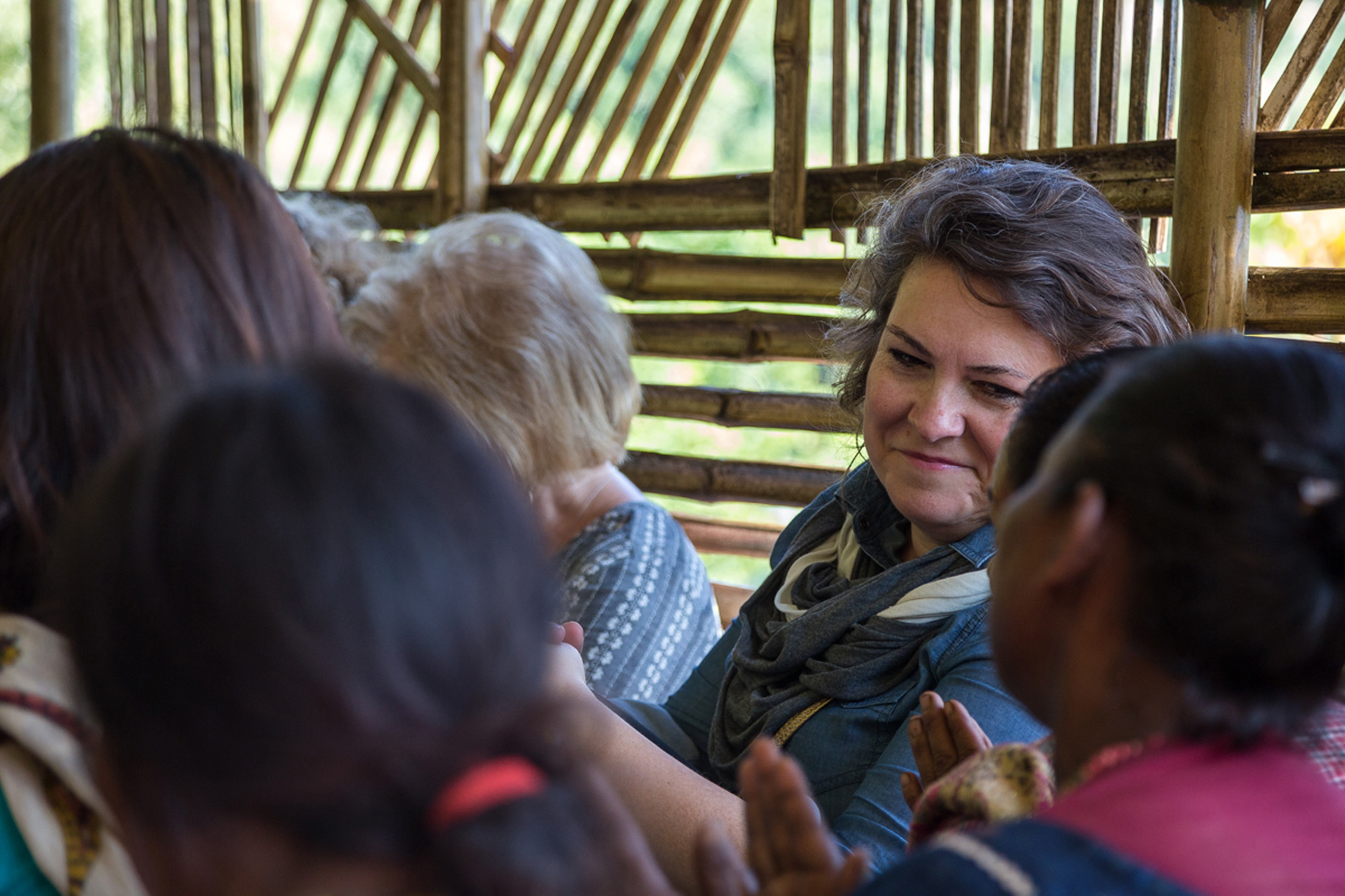 When I think about what happened here after the earthquake, [I’m reminded God] will turn our mourning into joy and He will trade ashes for beauty,” Felicity Martinez* said. Martinez founded EveryDay Ministry in Broken Arrow, Okla. Martinez had a chance to pray for a number of women in the congregation.
When I think about what happened here after the earthquake, [I’m reminded God] will turn our mourning into joy and He will trade ashes for beauty,” Felicity Martinez* said. Martinez founded EveryDay Ministry in Broken Arrow, Okla. Martinez had a chance to pray for a number of women in the congregation.
Jessica Lewis,* from Paducah, Ky., said worshiping with the believers and seeing their joy despite trying circumstances was such an encouragement. Lewis is the assistant editor for Real Truth Matters Magazine.
“He will never leave you nor forsake you,” Lewis told the believers. “He has not forgotten you.”
*Names changed.
**********
Virginians are vessel for Christ’s compassion in Nepal
By Caroline Anderson
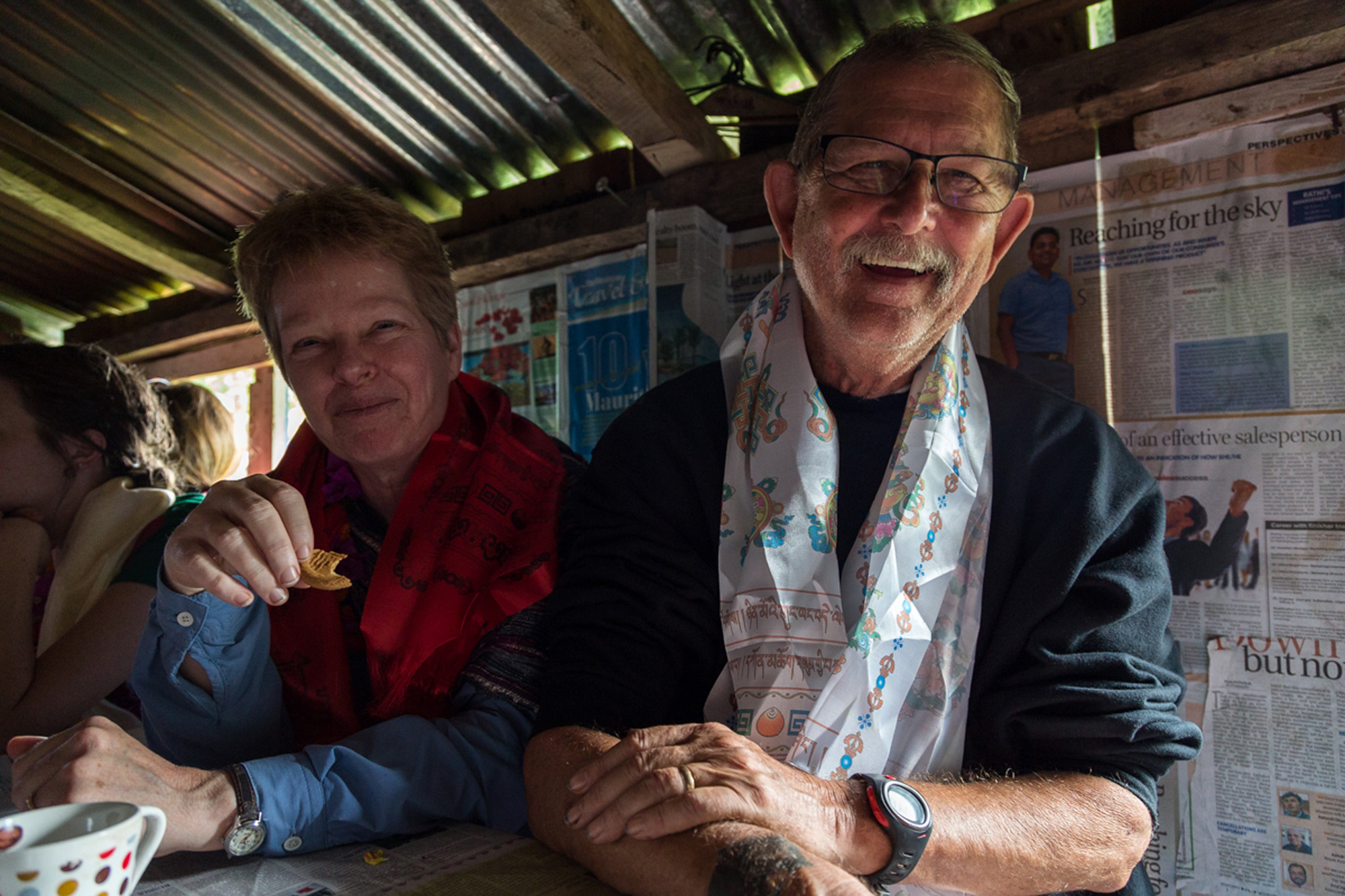 NEPAL (BP) — The village of scattered homes clinging to the side of a mountain is a hidden gem — remote and difficult to access. But those who do make the journey are treated to views of carefully sculpted, mountain-terraced fields of rice and millet, and a panoramic of the Himalayas.
NEPAL (BP) — The village of scattered homes clinging to the side of a mountain is a hidden gem — remote and difficult to access. But those who do make the journey are treated to views of carefully sculpted, mountain-terraced fields of rice and millet, and a panoramic of the Himalayas.
The April 2015 earthquake couldn’t destroy this region’s beauty. Four Southern Baptist volunteers said the earthquake closed the chasm between Christians, Hindus and Buddhists.
The Southern Baptist Conservatives of Virginia (SBCV) convention made a one-year commitment to help a region of Nepal after the earthquake and sent volunteer teams to provide disaster relief.
The volunteers’ service throughout the past year spoke volumes to the village — especially because the Baptist Global Response (BGR) teams didn’t show favoritism. The volunteers helped everyone, regardless of religion. Because of this, Christians were seen by many as kind and compassionate.
Stephen Cooper* was on a plane five days after the earthquake hit to help assess the damage. He and his wife Elizabeth returned several months later to spend several weeks deconstructing fallen buildings, rebuilding a school building, and passing out blankets and medicine. Fellow Virginians Mark and Diana Henderson* came to serve alongside the Coopers.
Missions are a part of the fabric that bound the Hendersons together.
“We met on a missions trip, we got engaged on a missions trip, now we’re celebrating our first anniversary on a missions trip,” Mark said.
It was a no-frills anniversary with the couple camped out in a tent on the side of the mountain. To bathe, Mark held up a tarp by a public water fountain so Diana could take a splash bath.
Likewise, the Coopers celebrated their anniversary on an airplane.
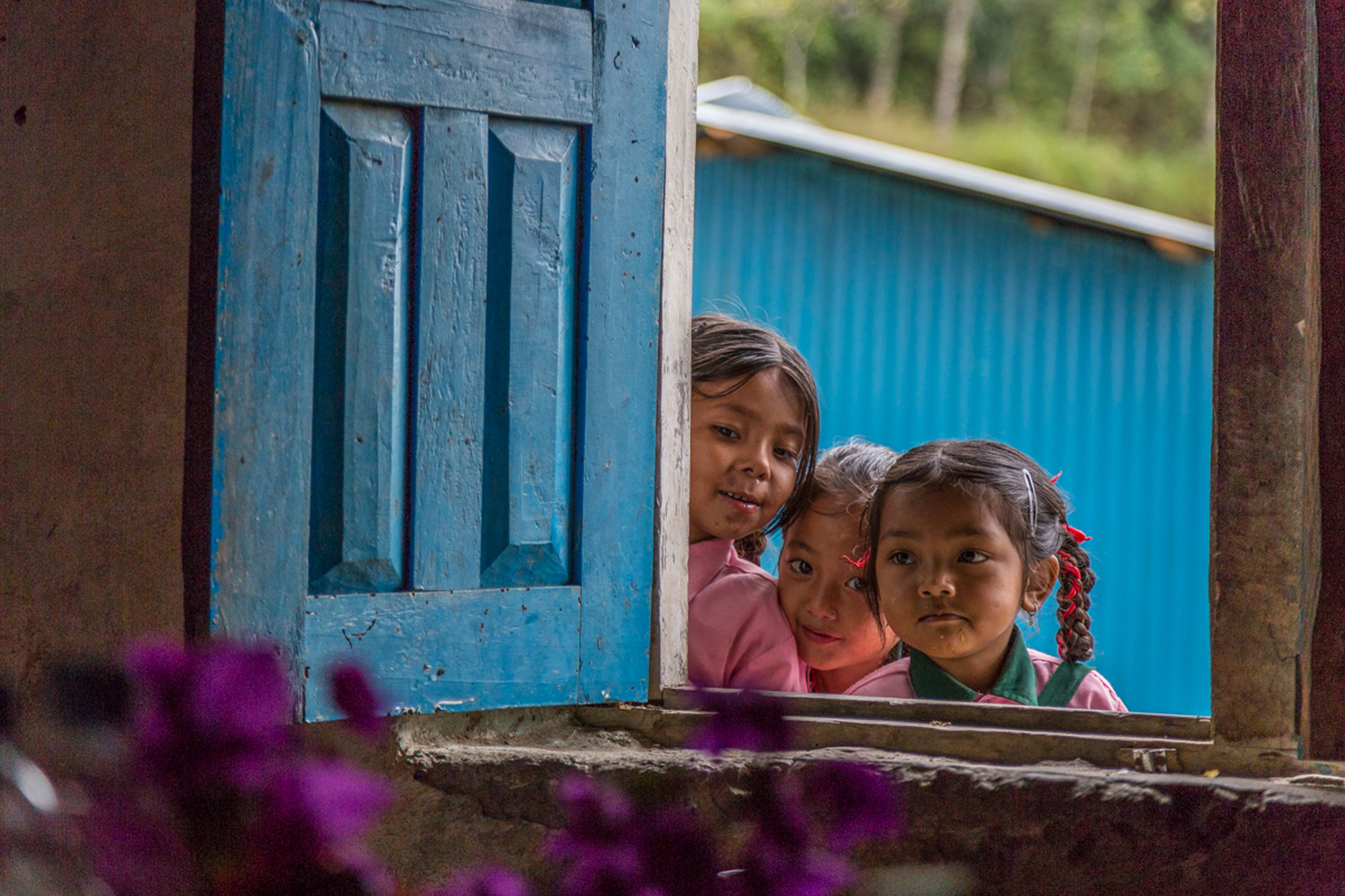 The Nepalese director of the school said without the volunteers’ help, the children would have nowhere to meet.
The Nepalese director of the school said without the volunteers’ help, the children would have nowhere to meet.
“We are thankful for the Southern Baptist(s) of Virginia,” said Muni Pariyar,* the school’s director, who is not a believer. “With the grace of God and the help of Southern Baptists of Virginia and BGR, children are able to return to school.”
“People in this village won’t forget how people from other countries came here to help,” another leader from the school said.
The Coopers and Hendersons said there are 300 families in this area, a total of 2,400 people, and they heard six families are believers.
Through the Coopers and the Henderson’s care and concern for villagers, the mood of the village changed. The tension between Hindus, Buddhists and Christians had been almost palpable. Ostracism, persecution and arguments divided the village and made life difficult for the Christians.
BGR came to their village, which is off the beaten path, and SBCV faithfully sent volunteer teams. During the weeks the Coopers and the Hendersons spent in the village, they served selflessly and offered to pray for the sick. Many accepted this offer.
“What we hope is that they see God’s love and His compassion,” Elizabeth said.
Villagers asked them why they came. “Because Jesus said to help others,” the Virginians answered.
“We believe we are all brothers and sisters,” Elizabeth told them.
Villagers also saw the volunteers’ devotion to the Lord. Elizabeth pointed to the spot where she had her quiet times. It overlooks a verdant valley and misty mountains of the neighboring country. As she read her daily devotion, men and women would walk by, stop, and inch forward to see what she was reading. She had opportunities to tell them.
“God is so clearly working here,” Elizabeth said.
Before the earthquake, there was a lot of persecution. Before, Hindus wouldn’t acknowledge Christians.
“God really works through disasters. … He puts people in a position to listen and be open, more so than under normal circumstances,” Elizabeth said. “This went from a village … against Christians to one that is open.”
The Coopers and Hendersons have empowered local believers. The local believers have given them an open door to their community.
“We’re temporary. We help encourage. We can help build relationships because they are curious, but it is the Nepalese believers who are here and going to be doing the real work,” Elizabeth said.
*Name changed.
**********
Troubadour creates beauty from earthquake’s ashes
By Caroline Anderson
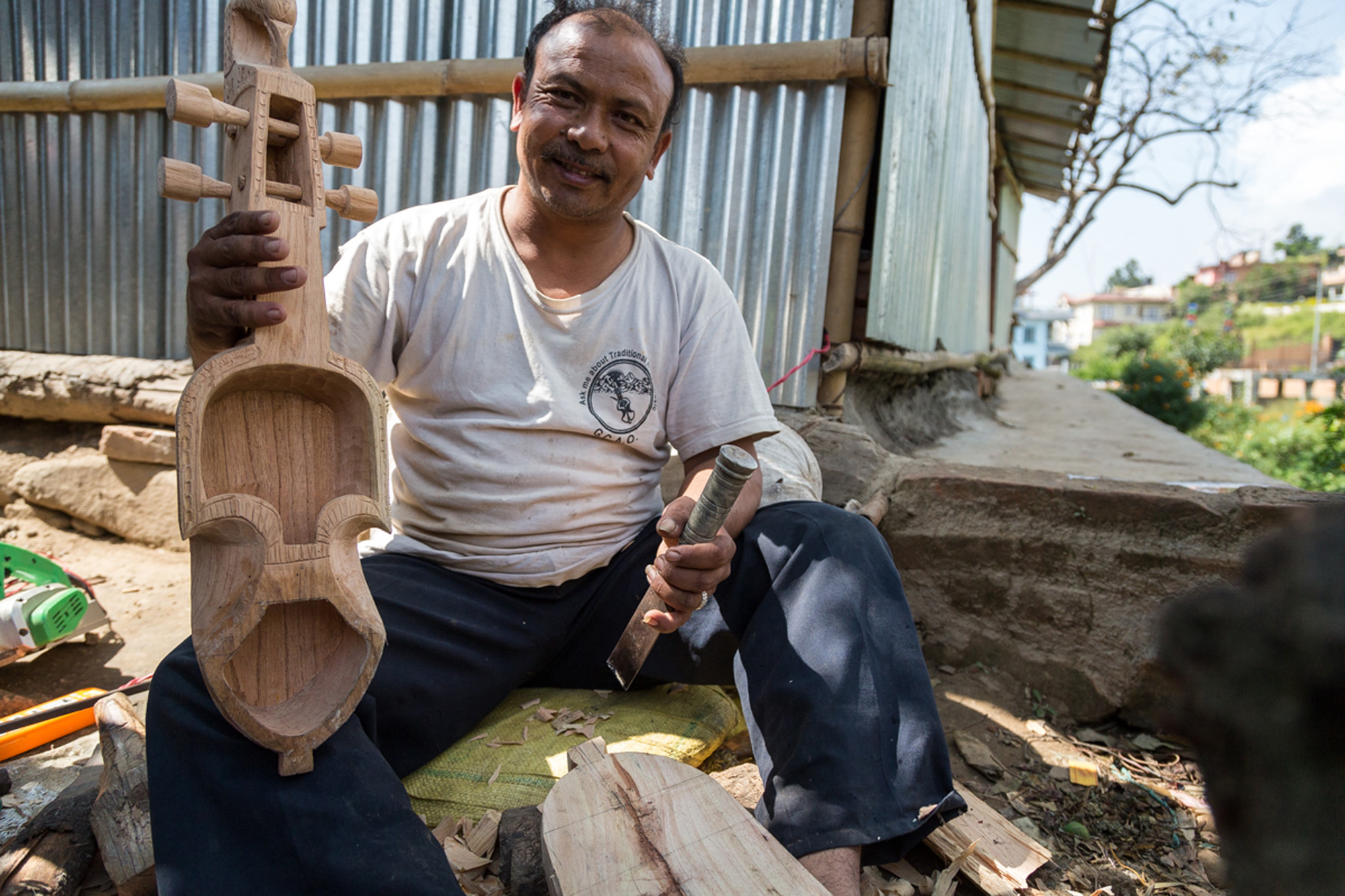 KATHMANDU, NEPAL (BP) — Outside the temporary tin church building, Padam Gandharva* sits on a stone and carefully chisels a block of wood that will soon be a musical instrument.
KATHMANDU, NEPAL (BP) — Outside the temporary tin church building, Padam Gandharva* sits on a stone and carefully chisels a block of wood that will soon be a musical instrument.
Shavings of fresh wood scatter in a semicircle. He wipes his brow with his T-shirt sleeve. His face and demeanor look tired — not from lack of sleep, but from weathering a tragedy that claimed his neighbors’ lives, his church building, his home and much of his means of income.
Padam lost nearly everything in the April 2015 earthquake except his faith in Christ and his ability to compose and play music that captivates a nation.
Two years ago, International Mission Board personnel spent time with Padam when he provided the accompaniment as multiple people groups in Nepal wrote and composed worship songs in their own languages. At that time his demeanor was poised and stately, but not proud.
Two years ago he had a coy look — the look of someone with an encyclopedic memory who could weave a yarn the length of the Himalayas.
This time, he seemed battered and worn, but not broken.
Padam is from the Gandharva people, who for centuries have been the troubadours and news bearers for the nation of Nepal. His people group plays the sarangi, a stringed instrument similar to a violin. Their songs tell stories of kings, queens and ages past, of current events and folklore. Wherever the Gandharva go, a crowd gathers.
The Gandharva are bearers of truth — even after the earthquake that claimed more than nearly 9,000 lives.
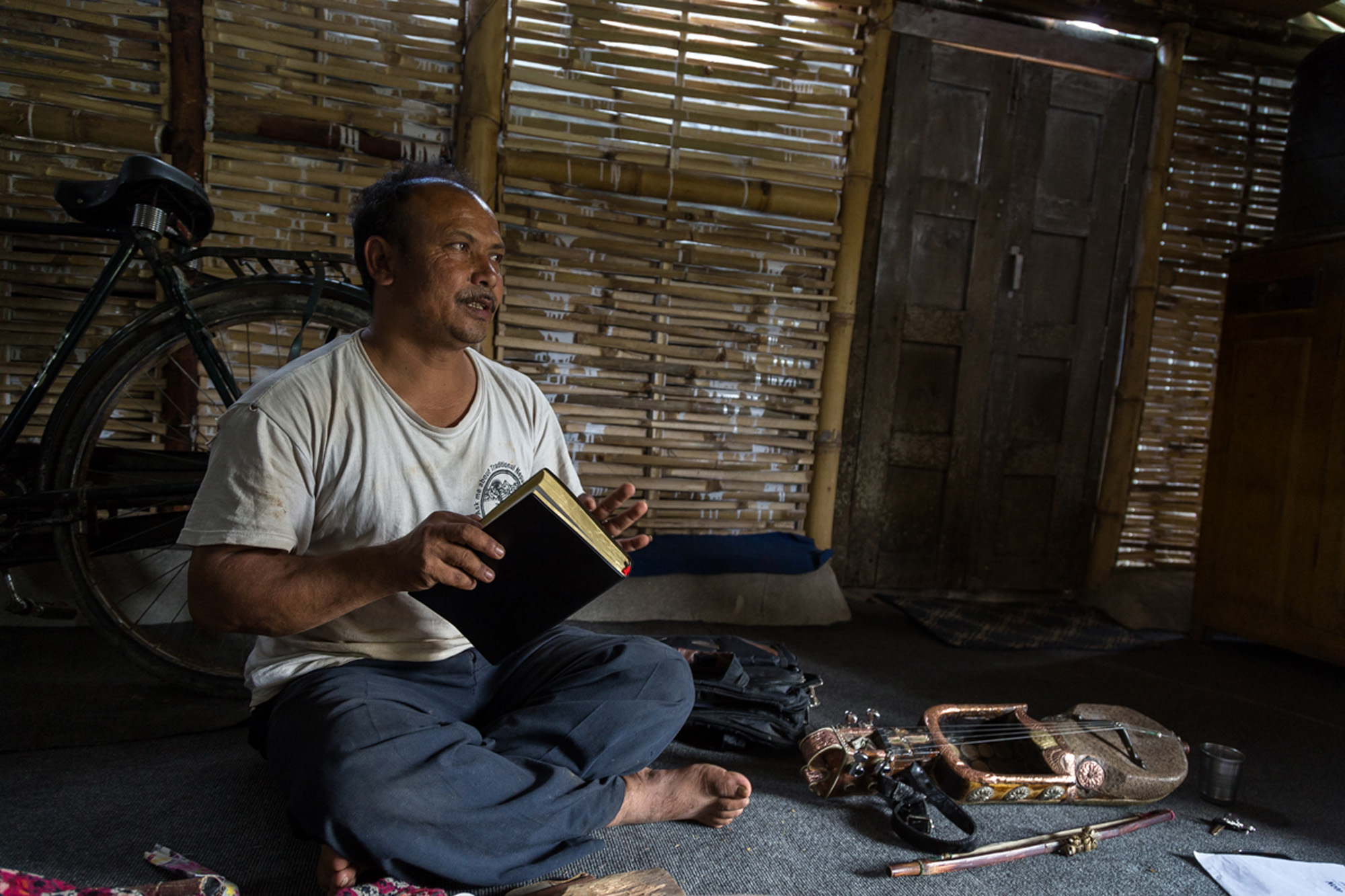 “We are Christian, but so many Gandharva are not Christian,” Padam says.
“We are Christian, but so many Gandharva are not Christian,” Padam says.
Inside the tin church building that was built after the earthquake, Padam sits cross-legged, the afternoon light coming in through the door.
He plays and sings the song he wrote after the earthquake to commemorate and mourn the dead. He closes his eyes during much of the song; he knows the sarangi notes by heart.
“I am looking everywhere, but there is nothing,” Padam sings. A tear escapes mid-song.
Several verses of the song describe how the earth shook and how people felt helpless because there was nowhere safe to hide. He sings of the thousands in the 14 districts that were affected. The song mourns the thousands who are still unaccounted for and the many orphans the quake left.
Padam visits villages and plays this song. It’s had a cathartic effect on the earthquake survivors, helping them grieve and mourn the loss of children, parents, best friends and neighbors. It’s healing Padam’s heart, too.
Musical ability runs in his family. Padam’s son, Samuyal, is in a band that plays a fusion of modern music and traditional sarangi music. They have visited 20 schools, playing God-centered music.
Padam doesn’t have much money to travel, but that doesn’t stop him. If his music can bring hope and healing, he goes no matter the cost. He makes the sarangis he sells. However, demand for sarangis has all but diminished — excess income in the nation has gone toward rebuilding.
Padam’s church supports him as well. However, that’s grown to be more difficult because church members also lost everything during the earthquake.
Padam knows healing comes from God. He had the church building rebuilt first, even before his own home, so his congregation would have a place to worship and commune. His home is makeshift and meager.
The tin church building offers no insulation from the sometimes-harsh Himalayan winter. Padam is hoping to purchase the land they’re currently renting for their church.
Though they’re struggling to make ends meet, Padam and his family pooled their funds to buy bags of rice, powdered milk for nursing mothers and chocolate for other survivors.
When the earthquake hit, Padam was preaching a sermon about God’s judgment day. He had just finished reading Micah 1:1-10 that talks about the mountains trembling and Amos 1:1, which talks of an earthquake to come.
A monastery sits on the hill that overlooks Padam’s home and church. Padam points to the hill, saying just as the verse in Micah foretold, the idols were broken into pieces. The monastery was heavily damaged in the earthquake. Kathmandu’s main Tibetan temple, Boudhanath, was heavily damaged.
“We [were] ready for the last prayer, and then the earthquake came,” Padam says.
As the wall of the church building fell in, he dove forward to use his body as a shield, saving the life of a 6-year-old boy. Padam’s church also meets in another location where the pastor, his son and grandson died in the earthquake. Padam says in that location those who fled the church building died; those who stayed inside survived.
Thirty-five people died near the church’s main location. In that area, the death toll was much higher than in the neighborhoods of ethnic Tibetans in town. Samuyal walks through the streets in his neighborhood, pointing out the damages and giving a death toll per building.
“Two people died there,” he says. “One person here.”
Life has managed to go on, somehow, despite the absence of neighbors and loved ones. Older men in their topis — traditional hats — sit outside teashops, sipping their piping hot milk teas. There aren’t as many smiles as there once were, and perhaps it’s only a semblance of normal.
But from the ashes, beauty is rising — the beauty of new believers.
“So many people believed after this,” Padam says. He says seven people chose to trust Christ, and the two church locations are growing.
It also solidified believers’ faith. “So many Christians, believers, believed that God is Truth,” he says.
The Gandharva’s musical storytelling is an oral history. This chapter of Nepal’s history is a sad one, and it’s an era that is still evolving, but hope is in the hearts of believers, and healing is coming through Padam’s songs. He bears the Gospel message wherever he goes.
Pray:
–Pray for Padam and his church’s ministry, and that they would gather the funds needed to rebuild their church.
–Pray for a steady income for Padam’s family.
–Pray for the church to continue growing.
*Surnames in Nepal are sometimes also the people group’s name.
















